Key takeaways:
- Community-driven campaigns emphasize collaboration and inclusivity, allowing individuals to feel a sense of ownership and involvement in local initiatives.
- Local search engines enhance community connection by helping residents discover local businesses, fostering local pride and economic support.
- Effective campaigns utilize strategies such as understanding audience needs, leveraging local influencers, and maintaining consistent messaging to engage the community.
- The future of community-driven initiatives is expected to focus on inclusivity and data-driven approaches to better connect residents with local issues and initiatives.
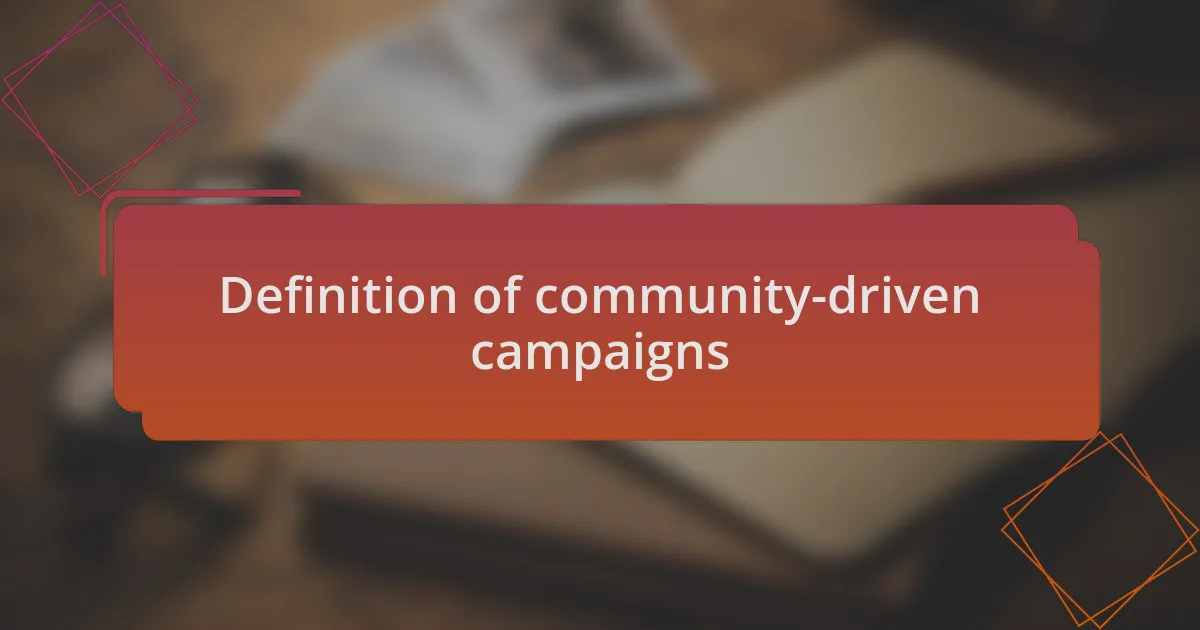
Definition of community-driven campaigns
Community-driven campaigns are initiatives that actively involve community members in the planning and execution process. They rely on the collective strengths, ideas, and resources of the community to address shared challenges or goals. Have you ever felt a sense of pride when you see people coming together for a cause? That’s the essence of community-driven efforts—they tap into the passion and dedication of individuals working toward a common objective.
At their core, these campaigns hinge on collaboration and inclusivity. I recall a neighborhood cleanup effort where local residents contributed not just their time but also ideas about what needed to be prioritized. It was fascinating to see how much more effective the campaign became when everyone felt a sense of ownership. Isn’t it amazing how powerful it can be when a group rallies together to create positive change?
Furthermore, community-driven campaigns often foster stronger social bonds, enhancing trust and cooperation among participants. They transform individuals into stakeholders who feel invested in the outcome. Have you noticed how this deepens connections within a community? I’ve witnessed firsthand the joy and camaraderie that can blossom when people unite to work towards a goal, reminding me of the true potential of collective action.
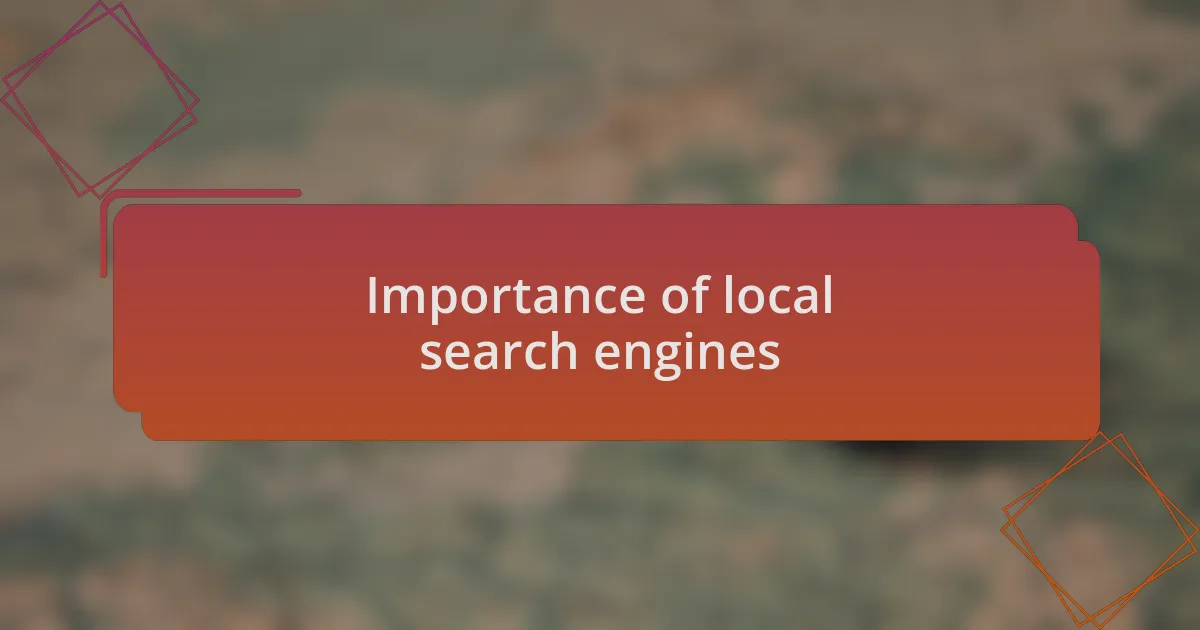
Importance of local search engines
Local search engines play a vital role in connecting communities with local businesses and services. They help residents find what they need in their vicinity, whether it’s a cozy café or a skilled plumber. I was once frantically searching for a last-minute birthday gift and stumbled upon a local artisan through a search engine, which not only saved my day but also supported a small business in my community. Isn’t it satisfying to know your purchases make a difference right where you live?
Moreover, these search engines foster a sense of belonging and local pride. By showcasing local businesses, they encourage residents to explore their neighborhood, discovering hidden gems and boosting the local economy. I remember taking a weekend stroll in my town, guided by local listings. It was not just about finding services but about uncovering the stories and personalities behind each shop or eatery. How often do we overlook the treasures in our own backyards?
Additionally, local search engines serve as a bridge between businesses and their customers. They provide essential information, such as hours of operation and customer reviews, which helps build trust and foster loyalty. When I recently wanted to try a new restaurant, the reviews I found through a local search engine gave me the confidence to visit. I wondered, how would I have even known about this delightful spot without that resource? It’s moments like these that highlight the immense value of having community-focused search tools at our fingertips.
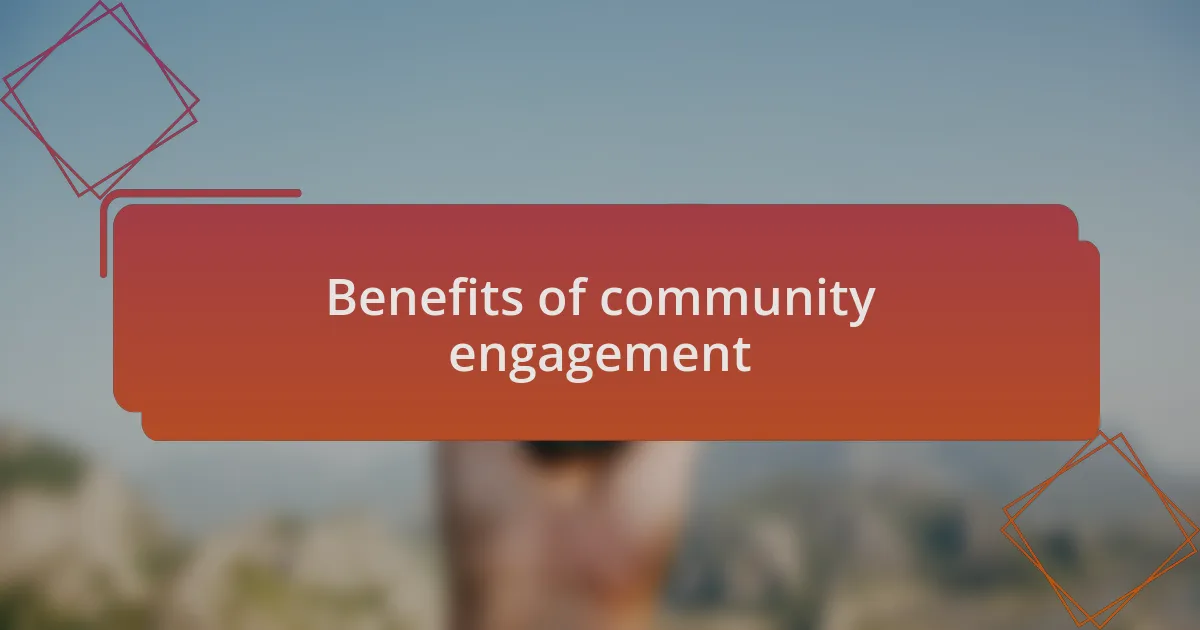
Benefits of community engagement
Community engagement offers numerous benefits that can transform the way we interact with our surroundings. When residents actively participate in local initiatives, they not only enrich their own lives but also cultivate a shared sense of ownership. I once joined a neighborhood clean-up project, and seeing everyone come together sparked a profound connection among us. It made me wonder, how much more vibrant could our community be if we all took a few moments to invest ourselves?
Another significant advantage is the creation of support networks. In my experience, collaborating with local groups has resulted in incredible friendships and valuable resources. For instance, when I needed advice on gardening, a simple conversation during a community event led me to local experts who were more than willing to share their knowledge. Isn’t it amazing how a little engagement can create a ripple effect of support in our community?
Moreover, community-driven campaigns often lead to increased visibility for local issues. I recall attending a town hall meeting about a proposed development in our area, where passionate voices came together to share concerns and suggestions. Through this collective action, we not only influenced local decision-making but also discovered allies who cared deeply about the same issues. Isn’t it empowering to realize that our collective voices can inspire change?
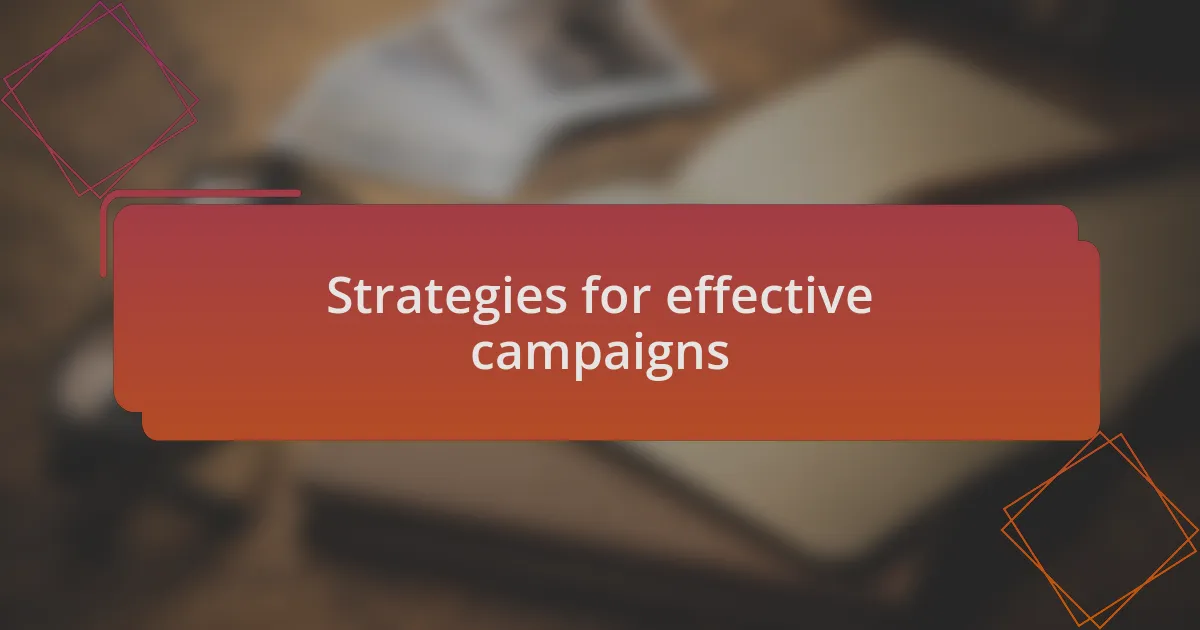
Strategies for effective campaigns
Creating effective campaigns requires a strong foundation built on understanding your audience. From my experience, I’ve found that conducting surveys or holding focus groups can yield invaluable insights into what really resonates with community members. Have you ever participated in a campaign that didn’t quite hit the mark? It’s often because the organizers missed a key detail about their audience’s needs or interests.
Another essential strategy is to leverage local influencers who already have the trust of the community. I remember collaborating with a well-known local artist whose work reflected the heart of our neighborhood. By encouraging them to share the campaign on their platform, we reached a wider audience more authentically. It made me realize: why not utilize the voices and personalities that locals already connect with?
Moreover, consistency in messaging is crucial for fostering recognition and engagement. When I launched a community project, I made it a point to maintain a unified theme across all our materials, from social media posts to flyers. The reaction was tangible; people began to recognize our campaign. Isn’t it remarkable how a cohesive message can lead to a more unified community response?
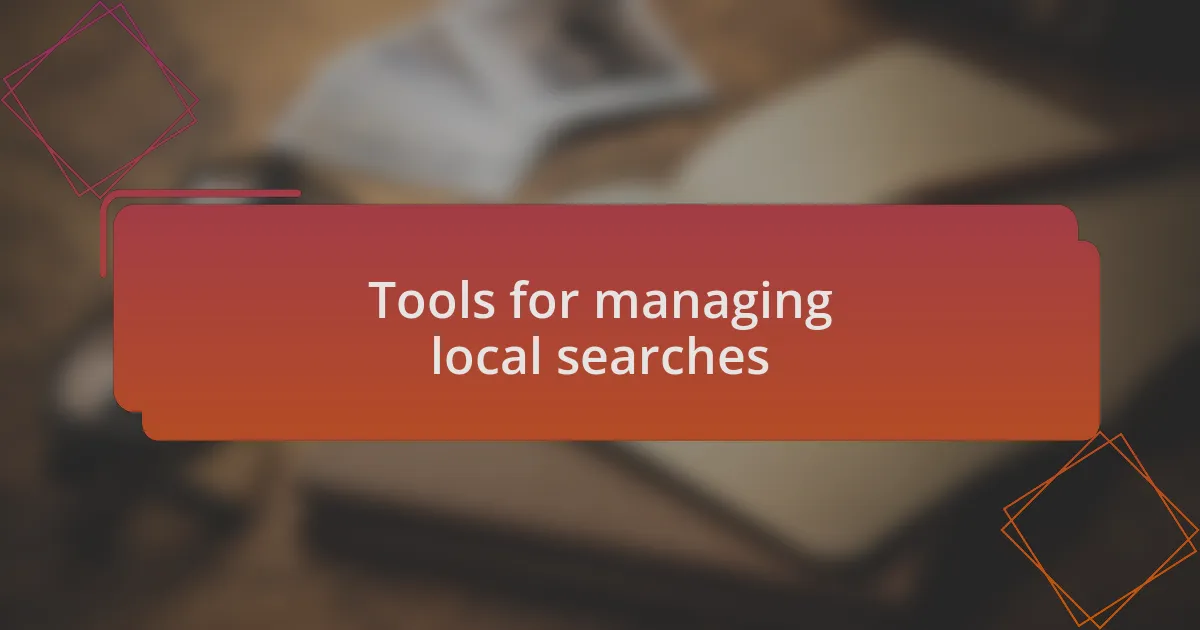
Tools for managing local searches
Managing local searches effectively requires the right set of tools. One tool I’ve found particularly helpful is Google My Business. When I updated my listing with accurate information and engaging photos, I noticed a significant uptick in customer inquiries. It’s amazing how something as simple as a well-maintained profile can put your local business on the map—literally!
Another effective resource I recommend is local SEO software like Moz or Ahrefs. These tools allow you to analyze local competition and identify relevant keywords that resonate within your community. I remember using Moz for a campaign where we targeted specific local phrases. The insights helped us fine-tune our strategy, and we saw improved search rankings almost overnight. Isn’t it fascinating how data can inform our actions?
Finally, let’s not overlook social media management tools such as Hootsuite or Buffer. I recall scheduling posts for a community event that not only kept our audience informed but also engaged them in conversation. By streamlining our messaging across platforms, we created a cohesive online presence that echoed our campaign’s goals. How often do you think about the power of timing in reaching your audience? It can make all the difference.
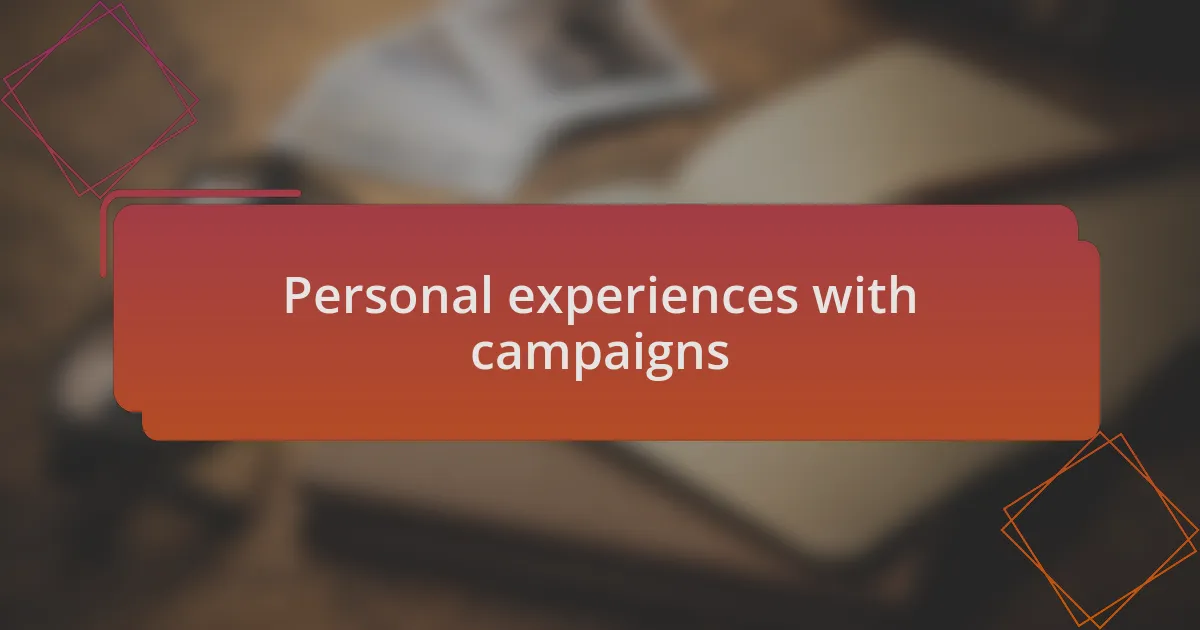
Personal experiences with campaigns
When I reflect on my experiences with community-driven campaigns, one particular initiative stands out. I participated in a local clean-up event organized through social media, and the excitement was palpable. Seeing neighbors come together for a common cause not only sparked a sense of camaraderie but also reinforced the importance of local stewardship. Have you ever felt that thrill of community connection? It’s truly transformative.
Another memorable campaign was a small business collaboration aimed at promoting each other’s services. I remember attending brainstorming sessions filled with energy and creativity. Working alongside fellow entrepreneurs, we pooled resources and shared our stories, which made our marketing efforts more relatable and authentic. This collaboration not only generated buzz but also strengthened our local network. How often do we underestimate the power of unity in business?
Lastly, I once launched a fundraising campaign for a local charity while leveraging local search tactics. The thrill of crafting the press release and targeting keywords that resonated with our community was exhilarating. It wasn’t just about raising money; it was about sparking conversations and raising awareness. The response was overwhelming—people rallied around the cause, demonstrating how deeply invested we all are in our community’s well-being. Isn’t it incredible how a focused campaign can amplify collective impact?
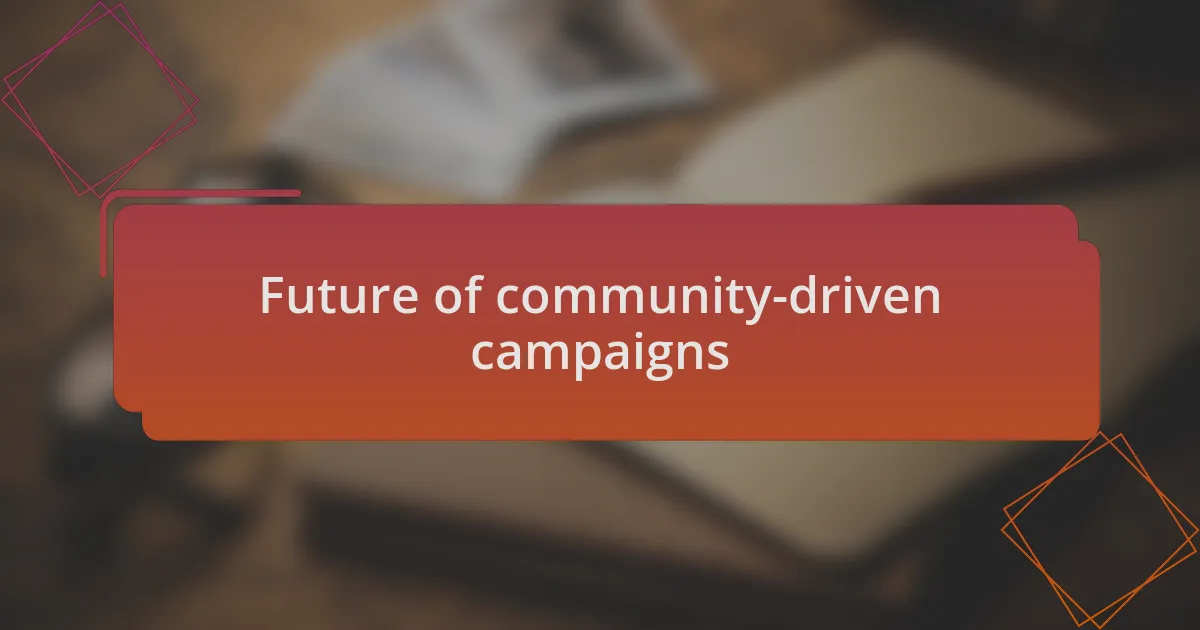
Future of community-driven campaigns
Looking ahead, I genuinely believe that community-driven campaigns will become even more integral to local engagement. With advancements in technology, particularly mobile applications designed for neighborhood connectivity, I foresee easier collaboration among residents. Imagine receiving real-time updates about local causes right on your phone. Doesn’t that sound like an exciting way to stay involved and informed?
In my experience, the future of these campaigns will likely focus on inclusivity and diversity, reflecting the rich tapestry of our communities. Consider how a platform could allow voices from all walks of life to share their ideas and contributions. Wouldn’t it be powerful to witness a melting pot of perspectives shaping initiatives that resonate with everyone? It’s this collective narrative that fosters meaningful change.
As we embrace this evolution, I anticipate deeper connections emerging between local businesses and residents. By leveraging data-driven insights, campaigns can become tailored to community interests and priorities. For instance, personalized outreach through social media can effectively engage specific demographics in a more impactful way. Can you imagine a future where every campaign feels tailored just for you? That kind of bespoke engagement could truly revitalize local environments.